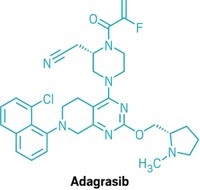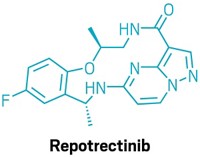Advertisement
Grab your lab coat. Let's get started
Welcome!
Welcome!
Create an account below to get 6 C&EN articles per month, receive newsletters and more - all free.
It seems this is your first time logging in online. Please enter the following information to continue.
As an ACS member you automatically get access to this site. All we need is few more details to create your reading experience.
Not you? Sign in with a different account.
Not you? Sign in with a different account.
ERROR 1
ERROR 1
ERROR 2
ERROR 2
ERROR 2
ERROR 2
ERROR 2
Password and Confirm password must match.
If you have an ACS member number, please enter it here so we can link this account to your membership. (optional)
ERROR 2
ACS values your privacy. By submitting your information, you are gaining access to C&EN and subscribing to our weekly newsletter. We use the information you provide to make your reading experience better, and we will never sell your data to third party members.
Oncology
Merck to acquire oncology-focused small-molecule firm ArQule
Deal brings noncovalent BTK inhibitor in mid-stage clinical studies
by Lisa M. Jarvis
December 9, 2019
ArQule has agreed to be acquired by Merck & Co. for roughly $2.7 billion in cash, making it the latest small-molecule-focused cancer drug firm to be swallowed by big pharma.
The deal, announced this morning, centers on ARQ 531, a small molecule that inhibits Bruton’s tyrosine kinase, or BTK, an enzyme that is crucial in the development and survival of B cells, a type of white blood cell.

Although several BTK inhibitors are already on the market—notably AbbVie’s Imbruvica, which is on track to bring in more than $4 billion in sales this year, and BeiGene’s recently approved Brukinsa—there is still room for more compounds. That’s because the approved drugs covalently bind to a cysteine residue on the signaling enzyme—a mechanism that works wonderfully until cancer cells mutate the residue.
ARQ 531 is one of a handful of noncovalent BTK inhibitors in the clinic that are designed to overcome the resistance mechanism. This morning, at a blood disease conference, ArQule unveiled Phase I clinical trial results that suggest ARQ 531 could be effective at treating several types of B-cell cancer. For example, the compound caused tumors, most of which harbor a mutation in the cysteine residue, to shrink in 8 out of 9 chronic lymphocytic leukemia patients.
ArQule’s stock price more than doubled today on news of the Merck deal and the encouraging clinical data. But investors also closely parsed the trial results to understand if ARQ 531 is meaningfully different than LOXO 305, a competing noncovalent BTK inhibitor developed by Loxo Oncology, which was acquired earlier this year by Eli Lilly and Company.
Data on LOXO 305 were also presented at the blood disease meeting, but feedback from oncologists so far suggests it’s “hard to pick a winner,” Evercore ISI stock analyst Umer Raffat said in a note to investors.
Merck’s purchase of ArQule is the latest in a string of big pharma acquisitions of small-molecule firms with prized oncology assets.
In addition to Lilly’s purchase of Loxo, Pfizer bought Array BioPharma, which added two approved kinase inhibitors and an assortment of clinical-stage compounds to the big pharma firm’s cancer portfolio. Merck also acquired Peloton Therapeutics for its collection of small-molecule inhibitors of hypoxia-inducible factor 2, the most advanced of which is in Phase II studies as a kidney cancer treatment.
“Not all drug targets are druggable with small molecules but, for those that are, small molecules will always have a cost advantage over biologicals,” says Bernard Munos, a senior fellow at the drug research think tank FasterCures. “This means more pricing flexibility and more profits—valuable features should pricing freedom be restricted.”
He adds, “The downside comes when patents expire, but that’s usually a worry for the next CEO.”





Join the conversation
Contact the reporter
Submit a Letter to the Editor for publication
Engage with us on Twitter